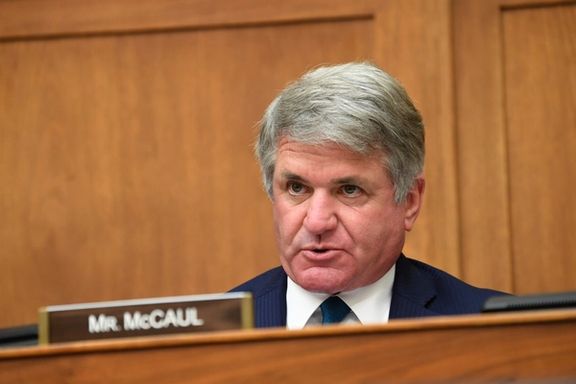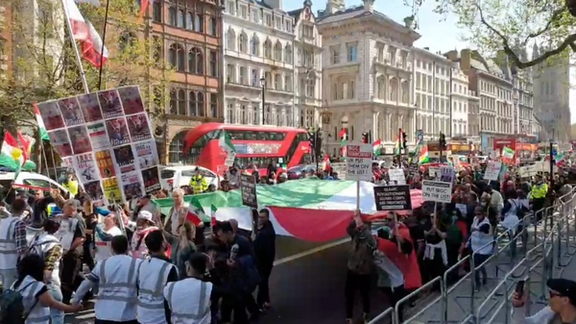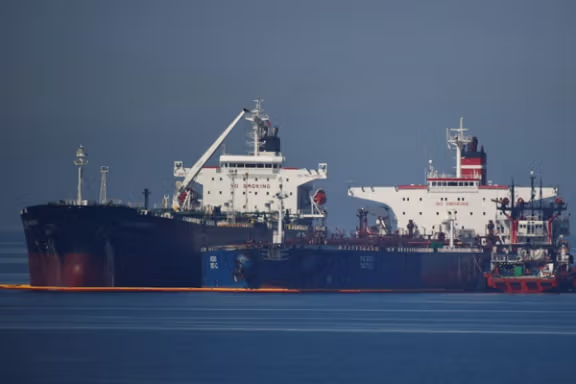US Lawmakers Introduce Bill To Permanently Authorize Sanctions On Iran

A bipartisan group of US lawmakers introduced legislation Monday to give permanent authorization to the president to implement sanctions on Iran, The Hill reported.

A bipartisan group of US lawmakers introduced legislation Monday to give permanent authorization to the president to implement sanctions on Iran, The Hill reported.
Iran’s sanctions Act (ISA) of 1996 has a sunset clause ending in 2026 and needs to be renewed by Congress, but the new legislation if approved would make the Act open ended until Iran is deemed to have changed its behavior.
The Solidifying Iran Sanction Act is sponsored by Rep. Michael McCaul (R-Texas), the chairman of the House Foreign Affairs Committee, and co-sponsored by 24 lawmakers in the House and Senate, including Reps. Susie Lee (D-Nev.) and Michelle Steel (R-Calif.)
“The Iran Sanctions Act is one of the most important tools in US law to compel Iran to abandon its dangerous and destabilizing behavior,” McCaul said in a statement.
“This bill takes the long overdue step of striking the arbitrary sunset from the law, so that sanctions will only be lifted if Iran stops its threatening behavior. Iran can’t run out the clock on US law,” he added.
Steel said Iran has “made clear it has no interest in participating in the international community or working towards peace.”
“The rogue state continues to make threats against democracy and actively sponsors terrorism around the world,” the lawmaker said in a statement. “Through this bipartisan, bicameral legislation, we can prevent Iran from possessing nuclear weapons and further jeopardizing global peace.”
Although the Biden Administration decided to hold nuclear talks with Tehran that could have left to the lifting of the most important sanctions, the diplomatic effort reached a dead end last September. In the meantime, Iran has been supplying weapons to Russia that are used against Ukraine.

Iran’s rial hit its lowest point in one month on Monday, falling by 10 percent against the US dollar, as sanctions remain in place and the economy is in crisis.
The rial hit a low of 550,000 against the US dollar for the first time since April 1, when an apparent intervention by the Central Bank of Iran (CBI) had brought the rate down to around 500,000 rial for each dollar.
In early 2018, the rial was trading at around 40,000 when former US President Donald Trump decided to pull out of the JCPOA nuclear agreement and impose crippling sanctions on Iran. Since then, the rial has fallen by almost 14-fold.
A series of worker strikes have been underway since April 22, affecting energy, petrochemical, steel and other sectors, as the rial falls and inflation spikes.
Monthly salaries for ordinary workers that were equivalent to $220 one year ago are now around $120 in purchasing power.
An Iranian official said Sunday that workers’ pay covers expenses for just nine days of the month for a small family.
Negotiations in 2021 and 2022 to reach a new nuclear agreement reached a deadline last September, prompting markets to sell off rials. Since then, the currency has lost half its value.
In addition to the nuclear issue, Iran’s supply of weapons to Russia and its brutal and deadly crackdown on anti-government protesters in recent months have made further talks more difficult as the United States demands Iranian policy changes at multiple levels.

Thousands of Iranians marched in London to 10 Dawning Street Saturday to ask the UK to proscribe Iran's Revolutionary Guards (IRGC) as a terrorist organization.
The protest rally was attended by activist Vahid Beheshti who has been on a hunger strike in London since February 23 outside the UK Foreign Office to raise awareness for the need to designate the IRGC.
In a speech, the 45-year-old Beheshti encouraged the Iranian opposition to foster solidarity. “They managed to strike us with dynamite in the past four months but let’s resume [our unity] from here, from London,” he said referring to the recent disputes among opposition groups and figures.
Activist Hamed Esmaeilion who resigned from the Alliance for Freedom and Democracy in Iranlast week also attended the rally and, in a speech, accused the IRGC of destroying Iran’s economy, environment and the future of all Iranians.
“Stop denying the truth. This evil entity should not have a place in the future of Iran,” he told western governments, including Britain and the European Union that have been cautious to designate the IRGC for fear of further alienating the regime and in turn harm the prospects of negotiations over its nuclear program.
Esmaeilion also urged Beheshti who is now on day 66 of his hunger strike and in a wheelchair to end his action.
Also attending the rally was Alireza Akhondi, a Swedish-Iranian member of the Swedish Parliament who organized a large protest rally in Strasbourg, France, in January to encourage the European Parliament to designate the IRGC as a terrorist organization.
“IRGC’s revolting crimes are evident. It should be put on the list of terrorist groups the same as Da’ish and the Hezbollah of Lebanon,” Shahran Tabari, an Iranian-British journalist, a member of the Labour Party, and an expert on Iran-UK relationship, told the participants in the rally while stressing that the UK’s recent sanctions against the IRGC were “good but insufficient.”
Protesters chanted slogans such as “IRGC is terrorist”, “Down with the child killing regime” and “Down with the Islamic Republic.”
Several other Iranians have joined Beheshti’s protest action in the past weeks and set up their tents for a sit-in in front of the Foreign Office building.
Beheshti met with Tariq Ahmad, Minister of State for the Middle East, North Africa, and South Asia, at the Foreign Office earlier this week and later said they had discussed the UK’s sanctioning of four more IRGC commanders and the importance of proscribing the IRGC as a terrorist organization.
He had also met with the Minister of State for Security, Tom Tugendhat in March and been visited by MPs including Lord Stuart Polak at his tent.
“The Iranian regime is a dead horse. The UK government must not make a bet on a dead horse and should stand beside the people of Iran,” Beheshti’s wife, Coventry city councillor Mattie Heaven, told the rally.
British-Iranian comedian Omid Jalili also spoke at the rally, demanding the IRGC’s designation by the UK government. “The world will then follow suit,” he said.
Several other gatherings were simultaneously held in other European cities Saturday against the Islamic Republic including in Frankfurt, Germany, where Iranian monarchists gathered together upon a call by Iran's exiled Prince Reza Pahlavi and chanted slogans in his support.

The seizure of an oil tanker by Iran on Thursday might have been a retaliation against a reported US seizure of an Iranian tanker, sources have told Reuters.
The US confiscated Iranian oil on a tanker at sea in recent days in a sanctions enforcement operation, three sources told Reuters, and days later Iran seized another oil-laden tanker in retaliation, according to a maritime security firm.
As oil markets remain jittery, the cargo seizure is the latest escalation between Washington and Tehran after years of sanctions pressure by the US over Iran's nuclear program. Iran does not recognize the sanctions, and its oil exports have risen since 2021, after falling sharply during the Trump administration.
Tehran says its nuclear program is for civilian purposes while Washington and its allies in Europe and the region suspect Iran wants to develop a nuclear bomb.
Washington has not said anything about the tanker seizure.
Maritime security company Ambrey said the US confiscation took place at least five days before Iran's action on Thursday. "Ambrey has assessed the seizure by the Iranian Navy to be in response to the US action," it said in an advisory to clients.
"Both tankers were Suezmax-sized. Iran has previously responded tit-for-tat following seizures of Iranian oil cargo." However, the tanker Iran seized belons to a Chinese company.
The sources familiar with the matter, who declined to be identified due to the sensitivity of the issue, said Washington took control of the oil cargo aboard the Marshall Islands tanker Suez Rajan after securing an earlier court order. The tanker's last reported position was near southern Africa on April 22, ship tracking data showed.

The vessel's Greece-based manager, Empire Navigation, and the US Department of Justice did not immediately respond to requests for comment by Reuters.
The US Navy said Iran seized a Marshall Islands-flagged tanker in the Gulf of Oman on Thursday, the latest seizure or attack by Tehran on commercial vessels in sensitive Persian Gulf region .
Iranian state TV said on Friday the tanker ignored radio calls for eight hours following a collision with an Iranian boat, which left several crewmen injured and three missing. "Before using force, we tried to call the vessel ...to stop but they did not cooperate," Iranian deputy navy commander Rear Admiral Mostafa Tajodini told the broadcaster.
UN Secretary-General Antonio Guterres was aware of the Gulf of Oman seizure and reaffirmed support for international maritime law, a UN spokesperson said on Friday.
Last year the US tried to confiscate a cargo of Iranian oil near Greece, which prompted Tehran to seize two Greek tankers in the Gulf. Greece’s supreme court ordered the cargo returned to Iran. The two Greek tankers were later released.
As Iran’s oil illicit oil exports began to rise after President Joe Biden’s election in 2020, many US lawmakers began criticizing the administration for lax enforcement of sanctions. Some have accused the Biden team of having been soft on Iran with hope that negotiations to revive the JCPOA nuclear agreement would succeed.
The multilateral talks reached a deadlock last September and the US began imposing more sanctions on individuals and companies involved with Iran’s nuclear and military programs.
A bipartisan group of 12 senators on Thursday urged President Joe Biden to remove Treasury Department policy hurdles that have prevented the Department of Homeland Security from seizing Iranian oil shipments for more than a year.
In 2020, Washington confiscated four cargoes of Iranian fuel aboard foreign ships that were bound for Venezuela and transferred them with the help of undisclosed foreign partners onto two other ships which then sailed to the US.
With reporting by Reuters

The United States says that Panama has removed 30 Iranian vessels designated by Washington from its shipping registry, and they have been re-flagged as Iranian vessels.
A State Department spokesperson told Iran International’s Samira Gharaei Friday that the US Treasury Department updated its Specially Designated Nationals and Blocked Persons List (SDN list), marking the change in the status of these vessels.
“This SDN list update reflects the strong and long-standing partnership between the United States and Panama on respect for US sanctions in the maritime context.
We routinely work with Panama and other countries to ensure that their shipping registries are not abused by entities seeking to circumvent US sanctions on Iran.
Consistent with Panama’s domestic laws and international commitments, they have de-flagged hundreds of vessels since 2019,” the spokesperson said.
The US has designated hundreds of Iranian and other individuals, companies and vessels for suspected links to Tehran’s support for terror activities or assistance in Iran’s nuclear and missile programs.
There are also US sanctions on sectors of Iran’s economy as well as weapons programs. Many have also been designated for violating these US sanctions.
In most instances, US sanctions are also third-party sanctions, meaning any individual or entity breaking the rules will be separately be designated.
“We will continue to work with partners like Panama to ensure their registries and jurisdictions are not abused by entities attempting to evade our sanctions on Iran,” the State Department said.

A bipartisan group of US senators have written to President Joe Biden, urging the administration to enable Homeland Security to seize Iranian oil and gas shipments.
Six democrats and six republicans, led by Joni Ernst (R-IA) and Richard Blumenthal (D-CT), told Biden that the Homeland Security Investigations (HSI) office has not been able to seize Iranian shipments for more than a year.
The DHS program that used to seize illegal Iranian oil, gas and petrochemical shipments had confiscated $228 million worth of fuel linked to the Revolutionary Guards’ extraterritorial Quds Force -- a designated Foreign Terrorist Organization and an arm of the Islamic Republic that continues to sponsor attacks on US citizens and servicemembers -- from 2019 until fiscal year 2022, when the Treasury cut off its funds. HSI's enforcement has been curtailed by policy limitations within the Department of Treasury's Executive Office for Asset Forfeiture.

Referring to the Treasury Department’s acknowledgment in 2020 that “Iranian petrochemical sales remain a key revenue source for the Iranian regime,” specifically the IRGC’s Quds Force, the senators called for bridging the enforcement gaps concerning Iranian petrochemical and petroleum sales. “Enforcement of sanctions against Iranian petrochemical and petroleum sales will defund terrorists' intent on harming the United States and our partners,” read the letter.
“Despite several additional sanctions issued against Iranian petrochemical and petroleum sales over the past year, the volume of Iranian oil exports from Iran from 2021 to 2022 increased by 35%, approximately 430 million barrels of oil, evading sanctions,” they said in the letter.
A few hours after the letter was released, Iran seized a Marshall Islands-flagged tanker in the Gulf of Oman, the latest in a series of seizures or attacks on commercial vessels. "While Iran is seizing ships, our own program is completely languishing," an aide to Ernst told Reuters.